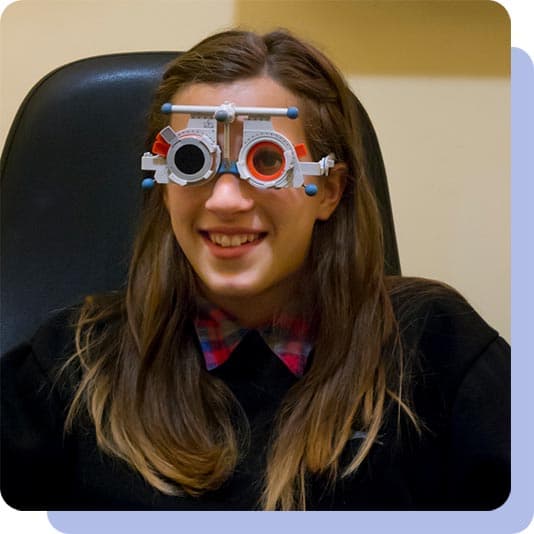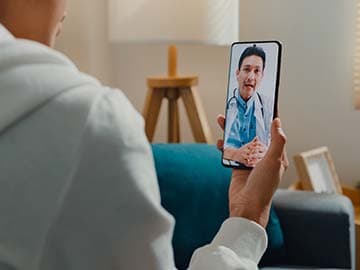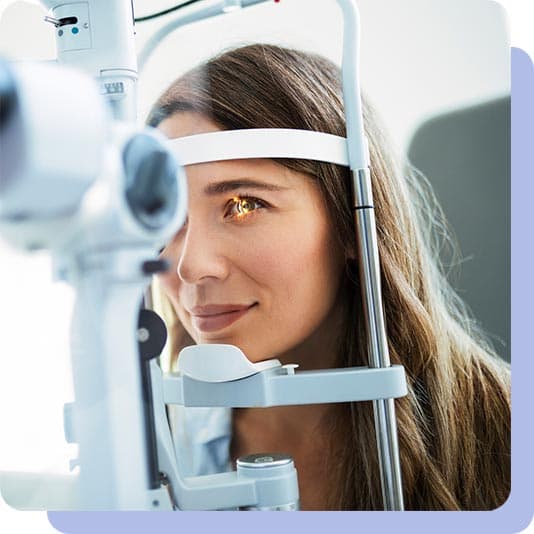A guide to your eye health

Published on 21/9/2021
Clinically reviewed on 27/9/2023 by Bryony Rhodes-Wort
Your questions about visiting the opticians and keeping your eyes healthy, answered by our clinical team here at Simplyhealth.
What is 'optical' treatment, and what does it cover?
The term optical covers everything to do with your eyes, from the health of your eyes and the quality of your eyesight. Optical treatment refers to professional care provided by a qualified eye specialist, such as an optometrist or dispensing optician.
Optical cover is a form of health insurance that covers eye treatments. Most Simplyhealth Health Plans include optical cover, but remember to read your policy carefully.
Knowing the practitioners
To be able to practise as an optometrist or a dispensing optician, you must be registered with the General Optical Council (GOC).
Why should you have a regular eye test?
An eye examination should be an essential part of your health routine. It's more than a simple test of your eyesight. Your optometrist is able to check your eye health and other general health issues during an eye examination, as well as being on hand to provide practical advice.
Here are some important reasons to have a regular eye examination:
Your optician can detect early signs of eye conditions before you notice them
They can also detect other general health problems
Checking for any changes in your vision which could affect your driving or eye comfort when reading
Unlike other parts of your body, your eyes often do not hurt if there is something wrong with them
When should you go to the opticians?
You should see an optician at least once every two years. However, you may need to be seen more frequently, depending on your age and health.
Your optician can recommend how regularly you will require an appointment, depending on your age and health. If you notice any changes or are concerned about your eyesight, then you should book an appointment with your optometrist.

What happens in an eye test?
During your appointment, you will have a comprehensive sight test. This will include a thorough examination of the front and back of your eyes for any health problems.
The vision test includes the use of a letter chart, which is used to determine how clearly you can see. Different lenses will be placed in front of each of your eyes to enable the optometrist to assess if a prescription is needed and, if so, to fine-tune this.
During your eye health check, your optician will check the condition of your eye’s various structures and may also perform tests to measure the pressure inside the eye. Eye movements and coordination are also checked to ensure that both eyes are working together, which assesses the function of the eye muscles.
Your optician will ask you a number of questions about:
Your general health and wellbeing
Any current or previous problems with your eyes
Any family history of eye problems, as some eye problems can be hereditary
Claim back your optical costs today
Our 1-2-3 Health Plan provides cover that’s ready to use whenever you need it, from £23 a month.
Related articles and guides

Your guide to the online GP
Everything you need to know about having a doctor's appointment through video call.
Health treatment guides
Learn about other treatments and services that can support your health and wellbeing, like physiotherapy, online GP services, and podiatry.

Three ways to look after your eyes
Discover three simple ways of looking after your eyes in your day-to-day life.
This material may contain links to other websites operated by third parties. It is the responsibility of third parties to ensure such material and websites comply with all relevant laws and regulations. To the maximum extent permissible by law Simplyhealth disclaims all responsibility for such websites.
